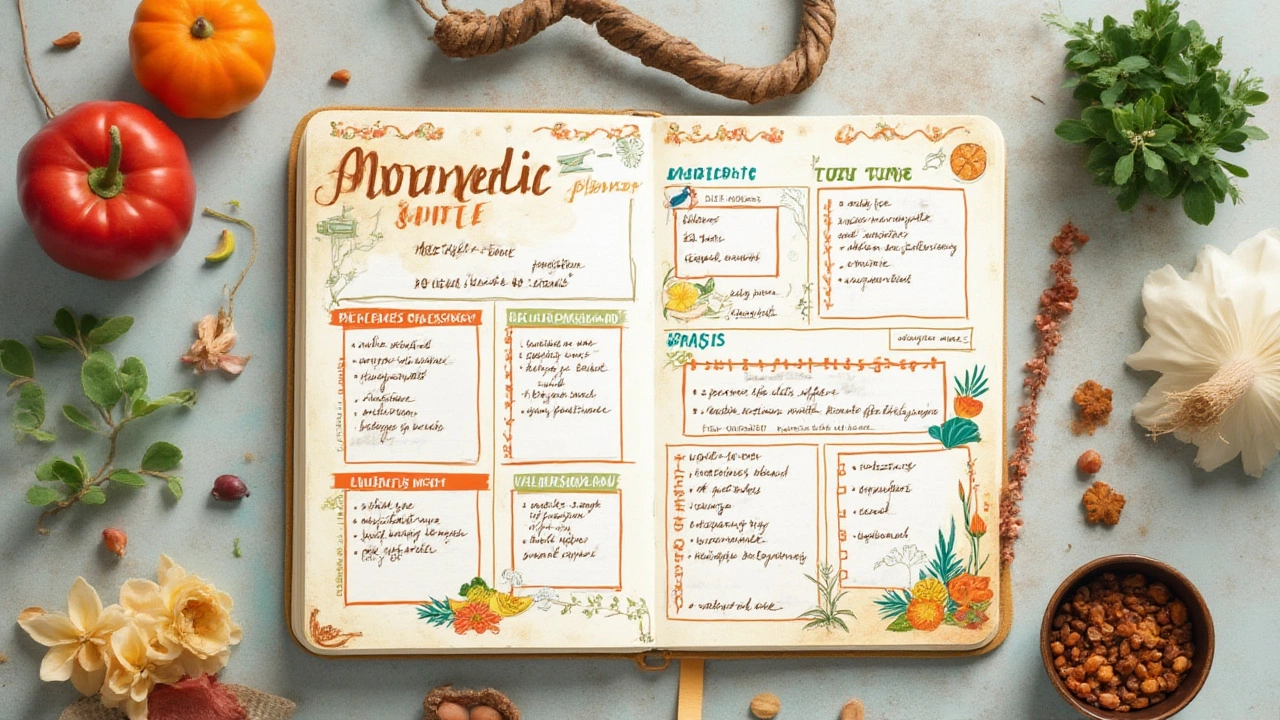-
8

80/20 Rule in Ayurveda: Discover Balance and Simplicity for Better Health
Ever noticed how the best health advice isn’t always about strict rules, but more about what works in real life? That’s where the 80/20 rule in Ayurveda sneaks in—a concept that has roots in both ancient wisdom and modern practicality. This isn’t some clever trick or marketing slogan made up overnight. The 80/20 idea actually fits perfectly with how Ayurveda views quality, moderation, and habit. It’s the ultimate reminder that you don’t have to be perfect to make big changes.
Understanding the 80/20 Rule in Ayurveda
Let’s set the scene. You might know the 80/20 rule (the Pareto Principle) from business—where 80% of results come from 20% of efforts. But Ayurveda flips that on its head for the mind, body, and habits. Here, it suggests going all-in with Ayurveda’s basics 80% of the time, leaving 20% for life’s curveballs, cravings, birthday cake, and plain old fun.
Ayurveda, a system practiced for more than 5,000 years, has always stressed balance, not asceticism. The ancients didn’t expect people to live like monks—just to make daily decisions that build up well-being. This flexible mindset is more important now than ever, considering the pressures of life in 2025. Following Ayurveda doesn’t mean skipping family dinners or never touching that chocolate chip cookie. Instead, it’s about consistency—not perfection.
Some Ayurvedic clinics and health experts even use the 80/20 rule to help patients bounce back after binge eating or holiday sessions. It takes the guilt out of occasional indulgences and helps people get back on track with their routines. The science backs it up—research on habit change and dietary discipline shows the most lasting success comes from moderate, sustainable effort, not rigid restriction. Even Ayurveda’s own texts, like the Charaka Samhita, highlight moderation and adaptability as key traits for a long, happy life.
Here’s how that looks day-to-day: eat Ayurvedic meals, meditate, and move for 80% of your week; allow yourself the remaining 20% to socialize, relax your rules, and accommodate real-world messiness. You’re much more likely to stick with the plan when you know there’s wiggle room. It all comes down to the principle of “mitha ahara” (measured eating), which is, in essence, Ayurveda’s own version of this rule.
Why does this matter? Ayurveda believes small but regular slips won’t knock your body or mind completely out of balance if the foundation is strong. In fact, obsessing about tiny slip-ups can do more harm than the slipperiness itself—leading to stress, guilt, and even the very thing you’re trying to avoid. The 80/20 guideline, then, is actually ancient insurance against the stresses of being ‘perfect.’

Practical Ways to Apply the 80/20 Rule to Your Ayurvedic Lifestyle
Here’s the part everyone likes—a real-world approach instead of an instruction manual filled with “don’ts.” Imagine adhering rigidly to traditional Ayurvedic diets, waking up at sunrise with a meditation bell. It sounds magical on paper but, for most, impossible in reality. The 80/20 concept meets you where you’re at.
- Plan Ayurvedic routines for your main meals but allow that Friday pizza with friends. Make lunch and dinner home-cooked and sattvic 80% of the week, and enjoy one or two ‘off’ meals guilt-free.
- Follow your daily rituals—like tongue scraping, warm water, and oil massage—most days. When you travel or life throws a curveball, skip a day and jump back in when you can.
- If you love coffee or chocolate, don’t go cold turkey. Instead, include them in that flexible 20%. Ayurveda says it’s not the single food, but the daily habit, that creates imbalance.
- When social events or festivals happen, participate with joy, not stress about breaking rules. That mental freedom is a health benefit Ayurveda supports!
You can build your own plan by listing out the Ayurvedic habits that matter most to you: meals, sleep, self-care. Then, figure out what counts as your 20%—maybe late night movies, Sunday brunch, or skipping the gym when you’re exhausted. When you work this way, your daily lifestyle feels supported, but not stifled.
Some experts offer a cool tip: treat your week instead of your day as your unit. So, if you eat three meals a day for seven days, that’s 21 meals. Under this rule, aim for at least 16 of those to be home-cooked, clean, and Ayurvedic. The rest? They’re up to you. This makes it harder to fall into an ‘all or nothing’ mindset, which often leads to a total collapse of healthy habits. People get results not because they punish themselves, but because they allow for being human.
Want to add some popular Ayurveda boosters? Try Triphala before bedtime most nights, but don’t worry if you skip a day or two. Use ghee and traditional spices in your kitchen as much as possible but grab takeout when you want it. Focus on small, regular routines rather than perfection.
If you’re just getting into Ayurveda, the 80/20 rule is your safety net. You don’t have to become a guru overnight. Start with basics: drink warm water in the morning, eat with mindfulness, create a regular bedtime, and practice gratitude. If you get this 80% right, Ayurveda promises a big pay-off. The best part? It respects that life is for living, not planning out every second for ideal health.

Benefits, Drawbacks, and Myths About the 80/20 Rule in Ayurvedic Health
The biggest draw of the 80/20 rule is its built-in kindness. It gives you a structure that fits with modern demands—work meetings, travel, surprise cravings—while upholding the spirit of Ayurveda. When you allow yourself freedom, research shows you’re less likely to binge or fall into yo-yo patterns. Modern-day influencers and real Ayurvedic doctors say sticking to this rule helps people stay consistent with good habits, month after month. That steadiness, not fleeting perfection, is what transforms health.
It also tackles stubborn myths about Ayurveda being ‘all or nothing.’ Some believe you have to give up coffee, sugar, or bread 100% forever. Not true. Ayurveda says your body is wise—you can handle occasional treats if your daily routines are nourishing. The 80/20 rule Ayurveda approach brings the whole science closer to people who might otherwise give up after one misstep. Even traditional practitioners, especially in Mumbai and Delhi, now openly talk about not letting guilt destroy your efforts if you eat outside the lines sometimes.
What about the critics? Some die-hard practitioners argue the 80/20 rule isn’t authentic. But a look into the original Sanskrit texts shows that even those teachers advised against rigid austerity unless you were training to be a sadhu (hermit) in the mountains. Ayurveda was made for householders—people with jobs, families, tough schedules. The 80/20 rule, if you think about it, is just the modern packaging of that wisdom.
Here are a few common slip-ups to avoid: don’t take 20% as a blank check for excess. Ayurveda stays clear about not using freedom as an excuse for overindulgence. Balance doesn’t mean flip-flopping endlessly between good and bad. Stick to your routines, respect your body, and let go of the guilt when you step off track. That’s the spirit.
One often-missed fact? The 80/20 rule is not just about food. Sleep, movement, stress management, even screen time—it applies everywhere. You don’t have to meditate for hours every single morning or walk 10,000 steps daily. Even here, if you hit the target most days, your mind and body will thank you. People who try to live 100% strict usually end up quitting after a month. Those who work the 80/20 rule often stick to their plans for years.
Here’s a tip that might surprise you: Ayurveda recommends seasonal breaks and occasional indulgences. Those festival sweets and rich meals? They’re not cheats, they’re part of the human tradition. The trick is to make health your default, fun your exception—not the other way around. The 80/20 rule simply spells this out so you can see real results but actually enjoy your life, too.
If you live with others—a partner, family, roommates—the 80/20 principle is a relationship-saver. It means not demanding perfection from others or yourself. You can navigate work parties, travel, or sudden cravings without obsessing. It’s no surprise that the healthiest communities in India and Sri Lanka use moderation, not rules, to pass on healthy traditions. Their people live longer, too, with less disease—ancient records show that people who balanced discipline and fun not only avoided burnout, but enjoyed more energizing relationships and creative work.
To wrap it up: perfection is overrated. Ayurveda stands for a sustainable health journey, not heroics. The 80/20 rule gives you space to build regular Ayurvedic habits while enjoying life’s flavors, friends, and festivities. If you follow the basics most of the time, you’ll see the kind of results that last—and you can finally stop worrying about doing everything ‘right’ all the time.